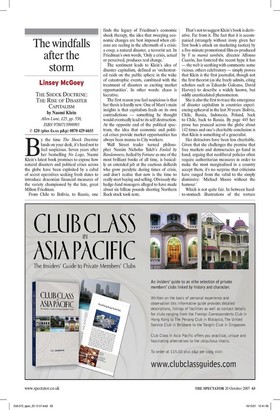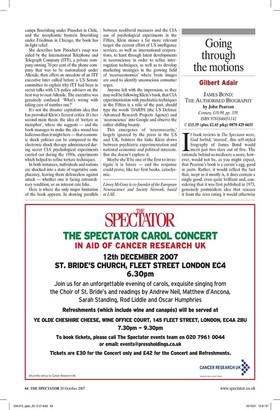The windfalls after the storm
Linsey McGoey THE SHOCK DOCTRINE: THE RISE OF DISASTER CAPITALISM by Naomi Klein Allen Lane, £25, pp. 558, ISBN 9780713998993 © £20 (plus £x.xx p&p) 0870 429 6655 By the time The Shock Doctrine lands on your desk, it's hard not to feel suspicious. Seven years after her bestselling No Logo, Naomi Klein's latest book promises to expose how natural disasters and political crises across the globe have been exploited by a cabal of secret operatives seeking fresh slates to introduce draconian financial measures of the variety championed by the late, great Milton Friedman.
From Chile to Bolivia, to Russia, one finds the legacy of Friedman's economic shock therapy, the idea that sweeping economic changes are best imposed when citizens are reeling in the aftermath of a crisis: a coup, a natural disaster, a terrorist act. In Friedman's own words, 'Only a crisis, actual or perceived, produces real change.'
The sentiment leads to Klein's idea of disaster capitalism, defined as 'orchestrated raids on the public sphere in the wake of catastrophic events, combined with the treatment of disasters as exciting market opportunities'. In other words: chaos is lucrative.
The first reason you feel suspicious is that her thesis is hardly new. One of Marx's main insights is that capitalism feeds on its own contradictions — something he thought would eventually lead to its self-destruction. At the opposite end of the political spectrum, the idea that economic and political crises provide market opportunities has always been manna to City workers.
Wall Street trader turned philosopher Nassim Nicholas Taleb's Fooled by Randomness, hailed by Fortune as one of the most brilliant books of all time, is basically an extended jab at the cautious dullards who grow paralytic during times of crisis, and don't realise that now is the time to really start buying and selling. Obviously the hedge-fund managers alleged to have made about six billion pounds shorting Northern Rock stock took note.
That's not to suggest Klein's book is derivative. Far from it. The fact that it is accompanied (strangely without irony given her first book's attack on marketing tactics) by a five-minute promotional film co-produced by Y tu mama tambien, director Alfonso Cuaron, has fostered the recent hype it has — the web is seething with comments: some vicious, others celebratory — simply proves that Klein is the first journalist, though not the first theorist (as she freely admits, citing scholars such as Eduardo Galeano, David Harvey) to describe a widely known, but oddly unarticulated phenomenon.
She is also the first to trace the emergence of disaster capitalism in countries experiencing upheaval in the last 30 years: Bolivia, Chile, Russia, Indonesia, Poland, back to Chile, back to Russia. By page 445 her prose has pranced across the globe about 142 times and one's charitable conclusion is that Klein is something of a generalist.
Her detractors have been less charitable. Given that she challenges the premise that free markets and democracies go hand in hand, arguing that neoliberal policies often require authoritarian measures in order to make the most marginalised in a country accept them, it's no surprise that criticisms have ranged from the rabid to the simply dismissive: 'Michael Moore without the humour.'
Which is not quite fair. In between hardto-stomach illustrations of the torture camps flourishing under Pinochet in Chile, and the sycophantic hysteria flourishing under Friedman in Chicago, the book has its light relief.
She describes how Pinochet's coup was aided by the International Telephone and Telegraph Company (ITT), a private company owning 70 per cent of the phone company that was to be nationalised under Allende, then offers an anecdote of an ITT executive later called before a US Senate committee to explain why ITT had been in secret talks with US policy advisers on the best way to oust Allende. The executive was genuinely confused: 'What's wrong with taking care of number one?'
It's not the disaster capitalism idea that has provoked Klein's fiercest critics. It's her second main thesis: the idea of 'torture as metaphor', where she suggests — and the book manages to make the idea sound less ludicrous than it might here — that economic shock policies can be compared to the electronic shock therapy administered during secret CIA psychological experiments carried out during the 1950s, experiments which helped to refine torture techniques.
In both instances, individuals and nations are shocked into a state of vegetative complacency, leaving them defenceless against attack — whether one is facing extraordinary rendition, or an interest rate hike.
Here is where the only major limitation of the book appears. In drawing parallels between neoliberal measures and the CIA use of psychological experiments in the Fifties, Klein misses a far more relevant target: the current effort of US intelligence services, as well as international corporations, to hunt through latest developments in neuroscience in order to refine interrogation techniques, as well as to develop marketing strategies in the growing field of `neuroeconomics' where brain images are used to identify unconscious consumer urges.
Anyone left with the impression, as they may well be following Klein's book, that CIA experimentation with psychiatric techniques in the Fifties is a relic of the past, should type the words 'DARPA (the US Defence Advanced Research Projects Agency) and 'neuroscience' into Google and observe the rather chilling bounty.
This emergence of `neurosecurity,' largely ignored by the press in the US and UK, bolsters the links Klein draws between psychiatric experimentation and national economic and political interests. But she doesn't explore it.
Maybe she'll be one of the first to investigate it in future — and the response could prove, like her first books, cataclysmic.
Linsey McGoey is co-founder of the European Neuroscience and Society Network, based at LSE.








































































 Previous page
Previous page